Pawslife Deluxe Convertible Pet Step Ramp Dog Cat Bed Stairs Steps Easy Ladder
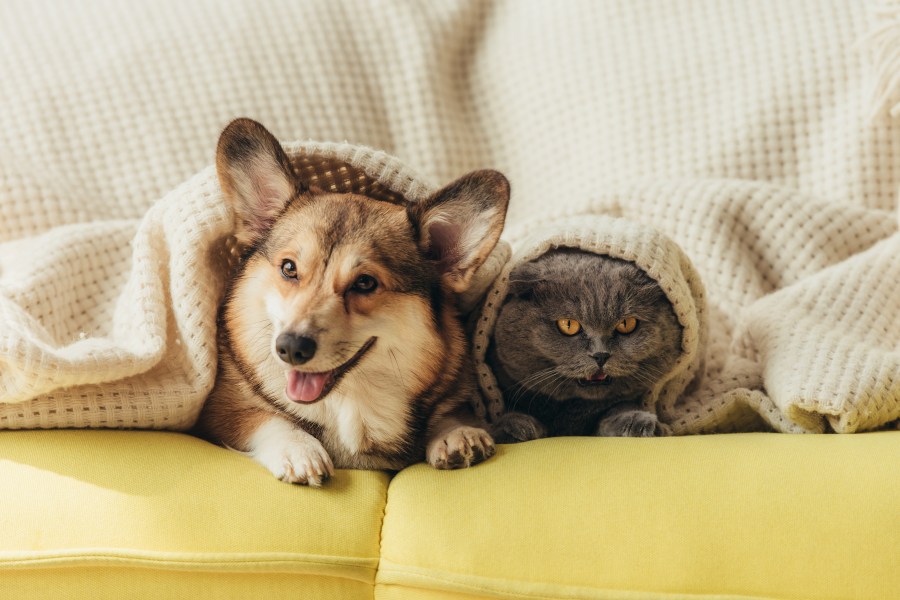
Dogs and cats are interesting creatures, sometimes exhibiting strange behaviors that may leave you scratching your head. What does nature have to do with the weird things our domesticated dogs and cats do? Here's a look at some of the most unusual dog and cat behaviors and the reasons behind them.
Why Do Cats Hide in Boxes?
A cat's favorite toy is a simple cardboard box. Or any enclosed object, for that matter, including laundry baskets, suitcases, backpacks, etc. Even the most social of our feline friends enjoy finding a snug place to hide. But why do cats prefer confined spaces?
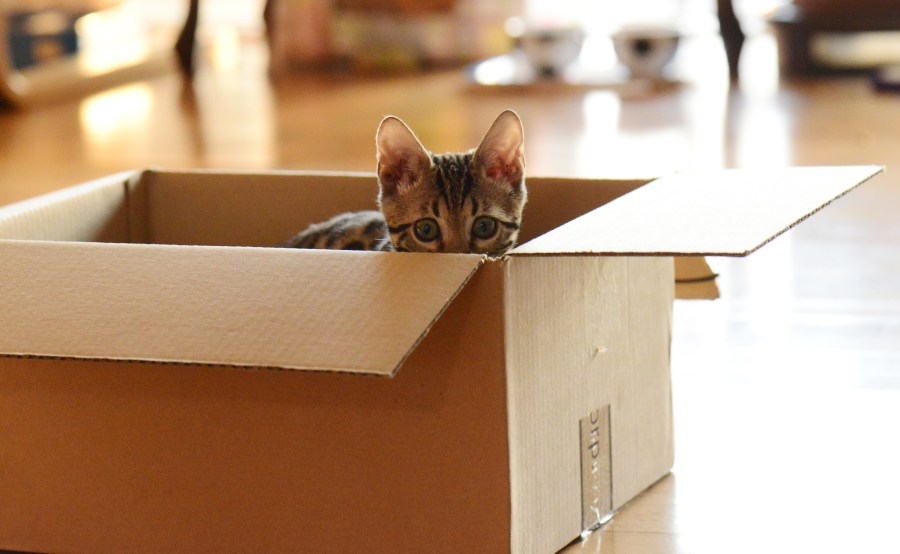
Hiding is instinctual behavior for cats; it ensures they cannot be snuck up on from behind or from the side. In the wild, small spaces provide a safe place for cats to take shelter from their predators or stalk their own prey. In your home, boxes, suitcases and other similar objects provide a place of safety and security, as well as a cozy place to curl up and sleep.
You may find it gross, but if your dog licks your face, it's a sure sign your pup considers you a friend. Licking is also a gesture of peace for dogs; a means of suppressing aggressive or overly dominant behavior.

Licking gives your dog a feeling of pleasure and comfort and may relieve stress as it releases "feel good" hormones known as endorphins. If Fido starts lapping your face, try not to push him away. Instead, close your mouth and eyes, turn your head to the side and yawn. This will signal that you've accepted your dog's offer of friendship.
Why Do Cats Awkwardly Open Their Mouths?
Commonly known as the "stinky face," this odd, open-mouth sneering face is the Flehmen response, and it's actually very scientific. If you've seen your cat lifting her lips as if in an aggressive snarl, there's no need to worry; your cat is responding to pheromones, aka scent hormones.

Cats use pheromones to communicate with each other. Every animal releases its own unique pheromones to mark its territory or signal its gender. The grimace you see is because your cat has trapped pheromones in her mouth and is using the powerful sniff mechanism to analyze those hormones.
Why Do Dogs Circle Before Lying Down?
Though it's not needed by most domesticated dogs today, your dog's ritual of circling before lying down is an evolutionary trait. In the wild, dogs needed to pat down tall grass to create a comfortable bed for sleeping. The easiest way to do so was by walking in a circle.

The act also served as a safety precaution for dogs in the wild, as flattening down grasses would drive out snakes or insects and was an easy way for them to signal the territory had been claimed by a particular dog. Times have changed and most pups today have a safe, comfortable bed to sleep in, yet the survival instinct ensues.
Why Do Cats Lick Their Humans?
A cat licking is often seen as part of the grooming process. Cats lick themselves in order to groom. Mother cats also lick their kittens to groom and clean them. But when a cat licks you, it is typically a sign of affection from your feline friend.

Kittens use licking to ease anxiety – much the same way humans use hugs – and a grown cat may lick you to signal you are important and part of the "family." Cats also release pheromones when they lick to mark their territory, so licking is one way for your cat to claim you as his property. Cats are attentive to the moods of their humans, so you may notice your cat licking you more if you are sick or upset.
Why Do Dogs Sniff Each Other's Behinds?
If you've ever taken your canine companion to the neighborhood dog park, you've certainly experienced this odd behavior. Consider dogs sniffing each other's butts similar to a human handshake – but there's even more to it than a simple greeting.
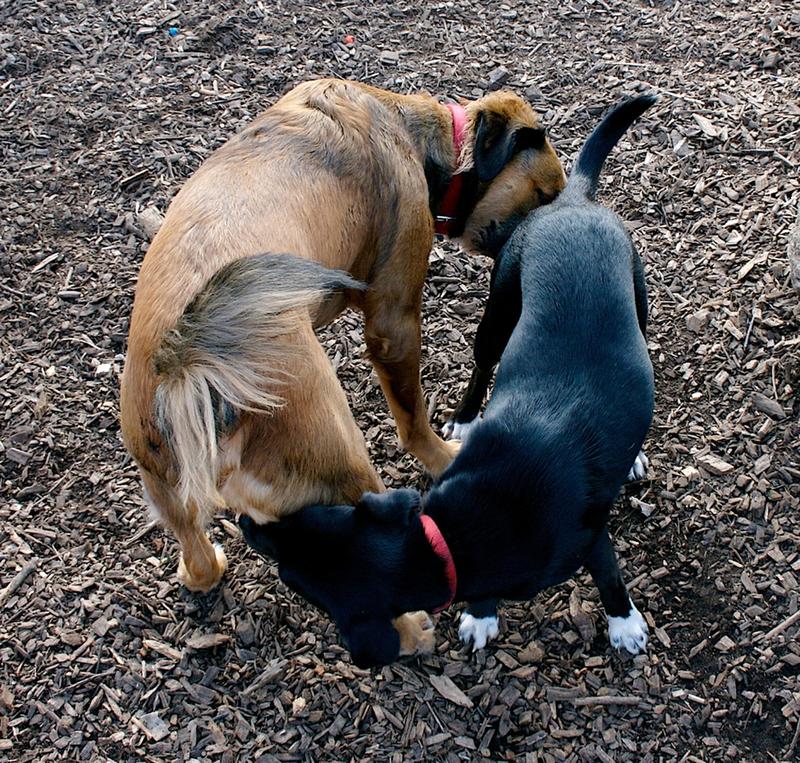
Dogs (and cats) have a special sniffing organ called the Jacobson's organ, which allows them to ignore certain smells when they sniff another animals behind. Instead, they are able to detect the scent of special chemicals released by glands located on a dog's rear end. Sniffing these chemicals allows a dog to learn important information to help them get along, such as whether the other dog is male or female, its age, what it eats, how healthy it is and even its current mood.
Why Does Your Cat Scratch at Everything?
There's not a single answer to this question, but rest assured, your cat isn't a bad kitty just because he scratches at everything in sight – including your couch. Scratching is a normal feline behavior, something cats do to show excitement, to mark their territory, to remove the dead outer layer of their claws, or to stretch and flex their feet and claws.
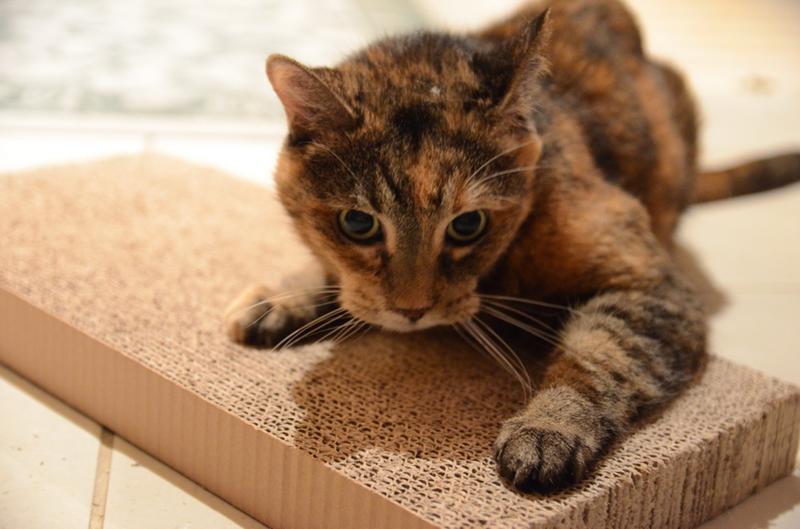
Scratching isn't a behavior you should discourage; instead teach your cat where to scratch and what is off limits. Cover areas that are off limits with double-sided tape or aluminum foil. The smells of citrus and menthol are typically a scratching deterrent for cats, so try soaking cotton balls in cologne or muscle rub and place them on the (non-fabric) surfaces you'd prefer your kitty leave alone.
Why Does Your Dog Sit on Your Feet?
If your dog lays or sits on your feet, she is exhibiting another ancestral pack instinct. In the wild, dogs sleep close to each other to stay warm and to protect themselves and the leader of the pack. Sleeping at your feet can be the sign of a submissive dog; if your pup lays at your feet, it's a sign she considers you the leader of the pack.

This behavior may also be a signal that your dog is fearful or needs a little extra emotional support. A dog who suffers from separation anxiety may lay or sit on your feet when you are at home as reassurance that you are close. And as with many other canine behaviors, this can be a way of marking territory – letting other dogs know you are taken.
Why Do Outdoor Cats Eat Grass?
Eating grass may seem like a strange behavior, until you consider how many other animals – cows, horses, etc. – consume grass as part of their normal diet. The juice that comes from grass contains folic acid, an important nutrient that supports a cat's health. If your cat is grazing on grass, it may be because she is supplementing a dietary deficiency.
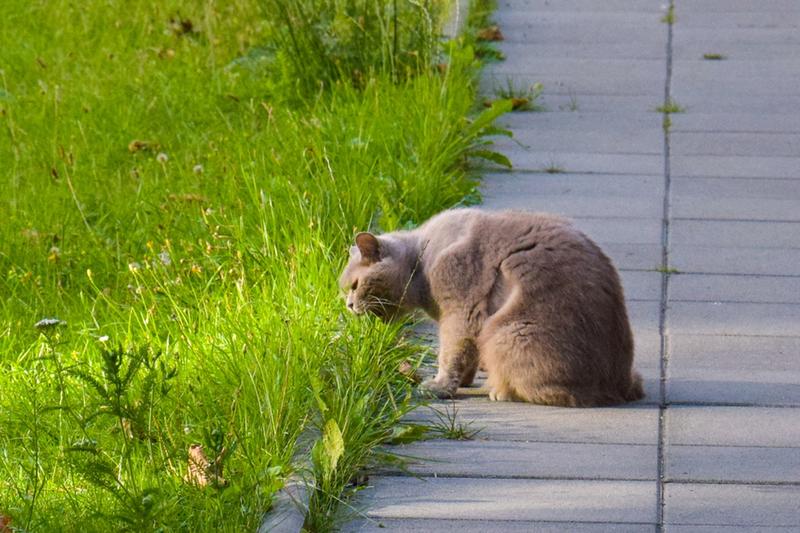
Eating grass can also relieve an upset stomach and serves as a natural laxative to help your cat have regular bowel movements. If your cat's digestive tract is clogged with fur from all the licking, she may eat grass to induce vomiting in order to clear out her stomach and digestive tract. While eating some grass isn't harmful, if you notice your cat eating grass on the regular, consult your veternarian.
Why Do Dogs Poop Facing North or South?
Research has actually found that dogs use the Earth's magnetic field – specifically the north-south axis – when relieving themselves. In one study published in the journal Frontiers in Zoology, researchers found that under "calm magnetic field conditions," dogs preferred to poop with their body aligned along the Earth's north-south axis, while avoiding east-west altogether.

The study reveals this behavior is common among dogs and was the first time "magnetic sensitivity was proven in dogs." However, the reason why dogs prefer to excrete when aligned with the north-south axis, or whether dogs do it consciously, remains unclear.
Why Do Pets Follow You Into the Bathroom?
You can always count on your pets to be at your side. Even when you don't necessarily want them to be there. Case in point: the bathroom. Have you ever noticed that your pet can't stand to leave you alone, even when nature calls?

If your dog follows you into the restroom, it's likely because their pack instinct is kicking in, making them feel vulnerable if left alone. If your cat is following you into the restroom, however, it's more likely that they're driven by the need to know everything that's happening within their territory (your home). This same instinct is why cats dislike any and all closed doors.
Why Do Dogs Chase Their Tails?
There may be no other dog behavior as amusing as watching your pup spin endlessly in circles, chasing her tail. While there is no single reason why a dog will try in vain to catch her tail, it may be a sign of boredom – a chance to burn some energy – or signal the need for positive attention and human interaction.

Tail chasing could be a sign that something is wrong with your dog, if she persistently goes after her tail attempting to nip at or bite it. In this case, your dog may be bothered by fleas, worms or another medical issue, or it could be a compulsive behavior related to previous confinement, abuse or trauma. If it seems your dog is tail chasing for more than entertainment, schedule an appointment with your pet's vet.
Why Do Cats Rub Their Heads Against People?
As is true of many strange cat behaviors, a cat rubbing or bumping his head on humans is another way of transferring his scent and claiming ownership. The gesture may also be used as a form of greeting or even of gathering information about a new person.

For some felines, head bumping is an invitation to be pet – cats typically prefer to be scratched or stroked on their heads, rather than their backs or sides. Cat owners may also observe their feline pets rubbing against household objects like furniture or a doorway. Much like rubbing against humans, a cat who bumps or rubs against objects is marking the area with his feline scent.
Why Does Your Dog Urinate on Car Tires?
A dog who lifts his leg to pee will urinate on vertical objects the majority of the time – 97.6 percent of the time to be exact, according to Bonnie V. Beaver, author of "Canine Behavior: Insights and Answers." Dogs do this to leave their scent at nose level to be sniffed by other dogs.
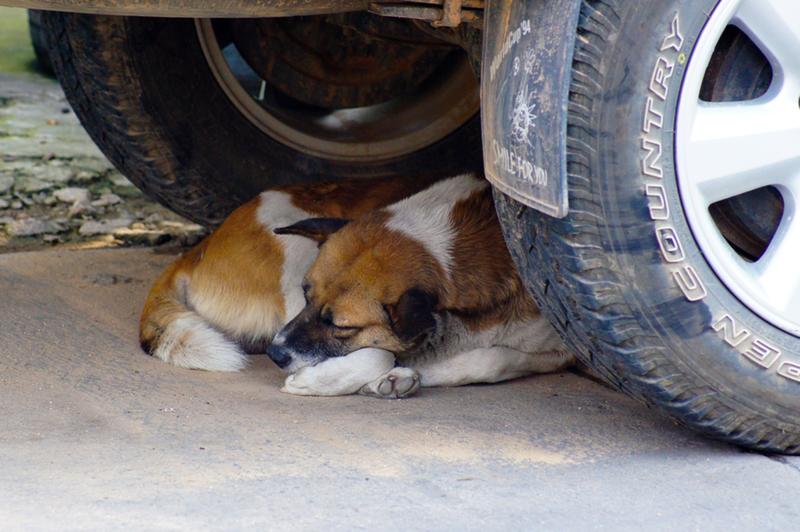
Not only is a car tire just another vertical object, it also holds a plethora of smells – food, garbage and roadkill, to name a few. Most dogs like smelly things, and they like to be the last one to mark a given spot. So one thing you can bet on – once one dog has peed on a car tire, others will follow suit.
Why Do Cats Bury Their Poop?
You might think your cat buries his waste because cats are obsessed with cleanliness, but it's a natural instinct that goes beyond being tidy. A variety of animal species use urine and feces to mark territory. In the wild, large, dominant cats such as lions, tigers or jaguars will leave their poop above ground in order to claim a particular area; whereas smaller, weaker cats will bury their waste to throw off predators and ensure the dominant animal does not feel challenged.

The typical domesticated cat will bury his poop as recognition that his owner is the dominant one in the household. But don't assume a cat who does not have this natural tendency is being rebellious. It could simply be that the behavior was never taught or reinforced by his mother.
Why Do Dogs Furiously Wag Their Tails?
It is commonly believed that a dog wags his tail to convey happiness or friendliness, but this isn't always the case. While a wagging talk can mean your dog is feeling happy or playful, it can also mean your dog is feeling fearful or insecure.

Researchers in one study discovered that tail wagging to the right indicates positive emotions and relaxes other dogs, while tail wagging to the left could be a sign of negative emotions and can make other dogs feel stressed.
Why Do Cats Raise Their Tail-end in the Air?
Much like a dog uses his tail, a cat's tail is also used to communicate. When you pet your cat on his lower back, you'll probably notice him lift his tail and raise his backside in the air – a motion that exerts slight pressure to increase pleasure. The base of the tail is also highly sensitive for cats, so scratching or petting in the area may feel something like the sensation of being tickled.

Lifting his tail-end in the air is also a way for your cat to spread his scent onto you, once again, marking his territory. An intact female feline will lift her backside with her tail off to one side to communicate to the male that she's ready for mating – a position known as lordosis. If you notice this behavior, best to keep your female cat indoors unless you're ready for a litter of kittens!
Why Do Dogs Snack on Feces?
Poo eating is a positively disgusting canine behavior that every dog owner has witnessed at some point in time. A dog who eats his poop may be doing so out of boredom or due to health issues.

Like many strange dog behaviors, eating feces is often simply instinctual – a mother dog will eat the stool of her puppies to help clean the "den" and protect her puppies from predators. During this stage, puppies pick up cues and learn behaviors from their mother, so naturally, they will follow her lead.
Why Do Dogs Eat Grass?
Does your dog habitually chew on grass in the backyard or at the dog park? Many dog owners worry that chewing on grass means that their dog is having digestive issues. Others believe that eating grass means that a dog doesn't have a well-balanced diet.

In reality, this behavior is rarely something dog owners have to be concerned about. Instead of eating grass to soothe their stomach or gain nutrients, experts have speculated that it's possible dogs eat grass simply because they like the taste.
Why Does Your Feline "Knead" You?
If you ever question your cat's affection for you, consider whether or not she kneads her paws on your lap, belly, arms, etc. This rhythmic motion is instinctual from birth; a nursing kitten kneads to stimulate the mother's milk production and adult cats continue to associate kneading with feelings of love and comfort. Cats are territorial and kneading is also a way they are able to "mark" their human owners.

Although kneading is a sign of affection, it can be quite painful if your cat has claws, but don't punish your cat for the behavior; she isn't intentionally causing you pain. Instead, try placing a barrier between your body and your cat, such as a folded up blanket. Keep your feline's nails trimmed or purchase nail guards to cover the nails.
Why Does Your Cat Like to Sleep in the Sink?
It may be an ordinary room to you, but kitties love bathrooms. The tub, the toilet, a cold tile floor, toilet paper rolls – a bathroom makes an extraordinary playroom for cats. Many cats also prefer to curl up for a nap in the bathroom, or more specifically, the bathroom sink.
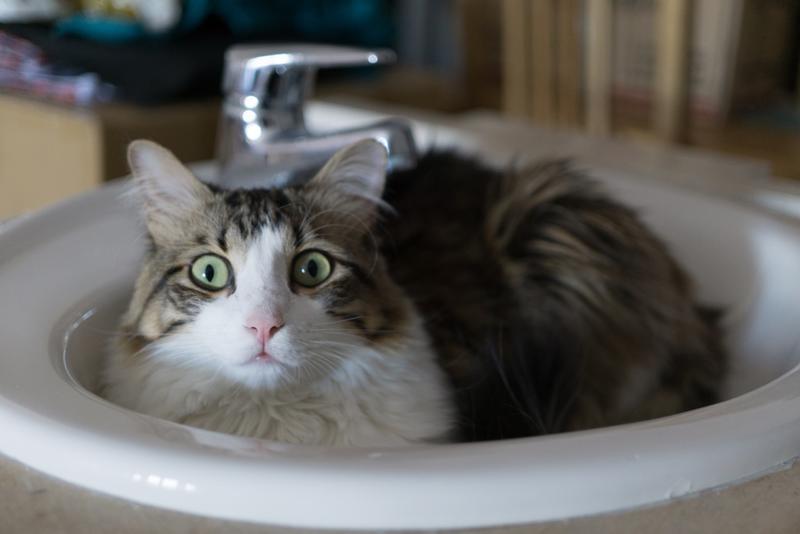
A sink is ideal for a bed, as it is purr-fectly shaped to cradle your cat's body. The coolness of the porcelain is soothing in warm summer months and can be cozy in the winter. In the sink, your cat also has the opportunity to lick drops of fresh water from the faucet.
Why Do Dogs Howl at Music?
Howling at music (or the howl of other dogs) is a common, ancestral dog behavior. In the wild, wolves, which are closely related to dogs, howl to communicate to each other. Amazingly, the canine species has a sense of pitch and when multiple dogs join in, they will each howl at a different note.

Music has the power to influence moods, even that of your dog. One psychologist found that dogs respond differently to different types of music. For example, dogs exposed to heavy metal music exhibited agitation and anxiety and started barking, while classical music caused the dogs to stop barking and settle down.
Why Do Cats Sprint Around the Room?
Nothing can be more obnoxious when you're trying to get a good night's sleep than hearing your cat sprinting back and forth across the bedroom floor. What is the reason behind this spastic behavior? Cats are nocturnal animals, meaning they become more active at night. A house cat who isn't getting exercise by hunting for food during the day may display a burst of energy at night.

This behavior could also be a sign of cognitive dysfunction in a senior cat, or irritation and itching from fleas or other pests. In rare cases, a condition known as feline hyperesthesia syndrome can cause mature cats to act out with behaviors such as biting at its back or running crazily around the house.
Why Do Dogs Hang Their Heads Out the Car Window?
Dogs are curious creatures, stimulated by sounds and smells. It may be the scenery, it might be the feel of a breeze in his face, but the likely reason your dog hangs his head out the car window is the buffet of smells available. The more air that wafts past the olfactory membranes of his snout, the more scents your dog can detect.
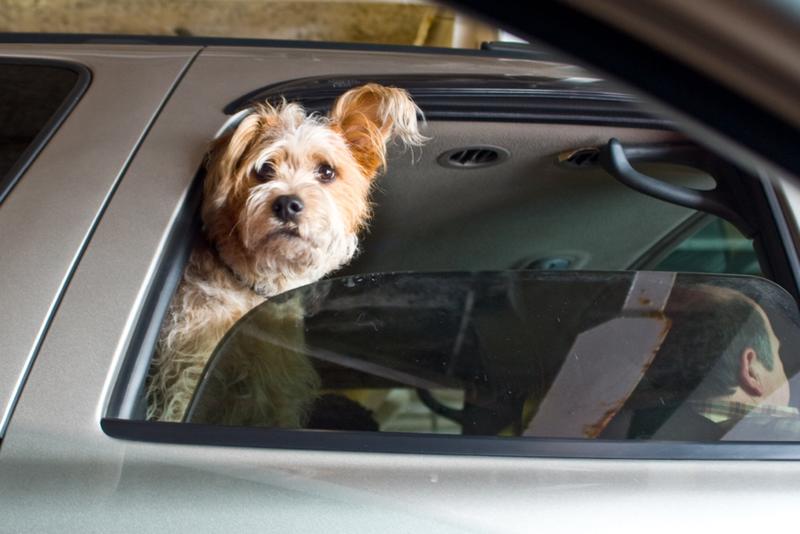
Before you roll the window down to your dog's delight, know that this seemingly innocent behavior could cause problems for your canine. Veterinarians warn that sticking their heads out of car windows is a major cause of ear infections for dogs.
Why Does Your Cat Attack Your Hands and Feet?
You wake up in the morning, place your feet on the floor and start walking to the bathroom, but after taking just a step or two, your cat pounces on your feet and sinks her teeth into your skin. Is this daily attack a sign of aggression in your kitty? Quite the opposite.

Feet and hands are both moving targets for cats, who are triggered by moving objects. This is why cats enjoy chasing string or darting after the red dot of a laser pointer. A playful kitty, or one who isn't getting adequate playful stimulation, considers your feet and hands a toy. In order to stop the behavior, offer your feline more playtime opportunities with cat-appropriate toys.
Why Does Your Pet Steal Your Socks?
Stealing items such as socks can be a learned behavior and is often something a pet will do for attention – even if it's negative. Reacting to your pet when you see them take off with a sock in their mouth will reinforce the behavior, teaching them to continue doing it. But this isn't the only reason cats and dogs like to steal socks; the act can also be a form of play for a pet who doesn't have a regular playtime routine.

For some pets, stealing may be about texture and seeking stimulation and the feel of different textures in their mouths. It can also be a sign of stress or anxiety and sucking on your sock may be just what your cat or dog needs to calm down. Remember animals are attracted to scents, and clothing that holds your scent may be soothing to your pet.
Why Do Cats Go Crazy for Catnip?
Catnip is an herb that contains a chemical called nepetalactone, which triggers a euphoric response in cats, much like how humans respond to hallucinogenic drugs. Catnip, however, is neither addictive or harmful for cats. Sniffing catnip can be a stimulant for cats, while eating the herb may have a sedative effect.

Not all cats are susceptible to the effects of catnip and not all feline reactions to catnip are the same. Only about 50 to 75 percent of cats will have a reaction to the chemical in catnip, and the sensitivity is inherited. While catnip produces a feeling of happiness in most cats, it can cause aggression in others; so use caution the first time you introduce catnip to your kitty.
Why Do Dogs Bark at Their Reflection?
Unlike humans, who recognize their reflection in a mirror, dogs do not recognize themselves. If your dog barks when she is standing in front of a mirror, she is barking at another dog who suddenly appeared out of nowhere. It's easy to understand how that can be startling for dogs!

Puppies may playfully interact with their reaction, as if they are inviting another pup to play or engaging in a social interaction. When the reflection does not return a reaction, most dogs will quickly lose interest. Some dogs may seem completely uninterested in their reflection because it carries no scent, and is therefore unimportant to your pet, to whom scent is everything.
Why Do Cats Bring Their Dead Prey Inside the House?
A cat's natural instinct is to hunt and to share their bounty with their pack. If you've ever wondered why your cat leaves "gifts" around the house in the form of dead prey, consider it a generous gesture by your cat – she considers you part of the family. Cats also instinctually teach their young how to survive, so bringing their catch into the home may be a way of teaching life-saving skills to family.

Although it should be considered an act of kindness by your feline friend, you can redirect the behavior into something a bit less gross by providing your cat with toys to chase and catch instead. Feather wands, moving toys and laser pointers are all effective alternatives for your cat compared to live prey.
Why Do Dogs Roll in the Grass?
Rolling in the grass may seem odd, but it is one of the most normal behaviors for dogs. The behavior is inherited from the dog's distant cousin, the wolf, who sniffs and rolls in newly discovered scents. Conversely, a dog might roll in grass not to pick up a new scent, but to get rid of unwanted smells.

Rolling in the grass is also an effective means of alleviating an itch, but could be a sign of skin allergies or flea or tick bites. Constant rolling around in the grass could be the sign of obsessive compulsive disorder, so if the behavior is frequent, consider making an appointment with your veterinarian.
Why Do Cats Always Land on Their Feet?
A well-known fact about cats is that they will land on their feet when they fall. It isn't a learned behavior, but a natural inclination. A cat is born flexible, with 30 vertebrae, and a vestibular system that indicates where he is in relation to the ground, whether upside down or walking around.

Although most cats will correct their balance during a fall and land on their feet, that doesn't mean cats are immune to fall-related injuries. The greater the height of the fall, the more time a cat has to right himself as he falls. Still, cats can suffer broken legs or more serious injuries from a fall.
Why Do Dogs Shake Off Water?
It only takes a few shakes for a dog to send about 70 percent of the water in her coat flying. It's nature's way for furry animals to quickly dry off – a survival technique to help regulate body temperature, particularly during cold weather. A wet coat cannot trap warm air next to the dog's skin, thus providing a layer of insulation from the cold.

Shaking is the quickest and most effective means of drying off, using far less energy than waiting for the water to evaporate. The loose skin on a dog's body is what enables the speedy side-to-side motion; the skin twists around much faster than the full body, acceleration increasing with every whip of the head. A wet furry mammal can shake so fast it generates a force 10 to 70 times greater than gravity! No wonder it takes such little time to remove the water.
Source: https://www.reference.com/pets-animals/dogs-cats-weird?utm_content=params%3Ao%3D740005%26ad%3DdirN%26qo%3DserpIndex&ueid=cce5b0c1-2005-4daa-a676-360af32936d8
0 Response to "Pawslife Deluxe Convertible Pet Step Ramp Dog Cat Bed Stairs Steps Easy Ladder"
Post a Comment